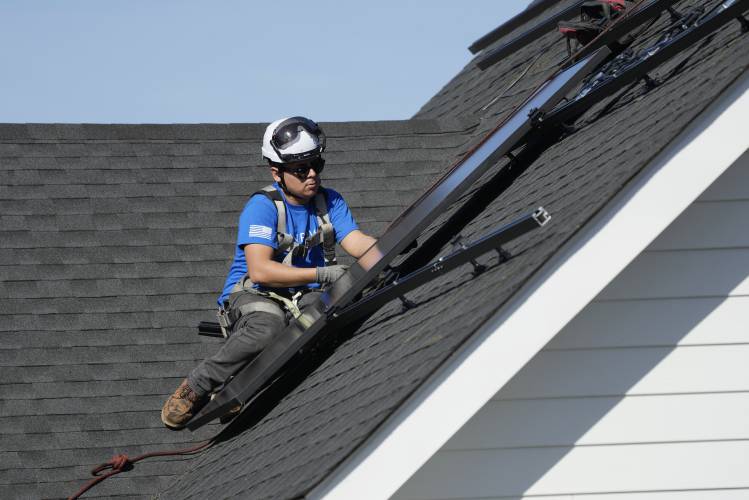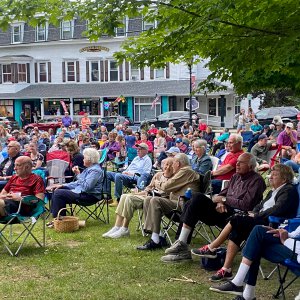Community power continues spreading through the region

Nam Y. Huh / AP Nam Y. Huh / AP
| Published: 03-09-2024 1:10 PM |
Community power, the system under which communities can buy their own electricity instead of depending on the utility, is continuing its rapid expansion in towns throughout the region.
Three Concord area towns are among the dozen launching the system through the non-profit Community Power Coalition this month, while the Merrimack County delegation is set to vote Friday on whether to make the program available throughout the entire county. Several other local towns are joining or voting on whether to join the program through a private broker, Standard Power of Nashua.
Standard Power received a boost this week when the Department of Energy shot down an effort by the state Consumer Advocate to pause its efforts for three towns in Eversource’s service area.
The ruling, which concerns the town of Jaffrey but applies to all the towns, allowed the program to continue even though as of Feb. 1, Eversource is charging a winter rate of 8.3 cents per kilowatt-hour, lower than the towns’ 20-month contract with Standard Power at 10.9 cents. Consumer Advocate Donald Kreis argued that this price difference violated the aggregation plan approved by regulators, which said that “no bid will be accepted higher than the utility default rate” when the program launched.
Department of Energy attorney Molly Lynch countered in a Feb. 29 ruling that Kreis’ argument was wrong because the agreement was executed back in October, when Eversource’s summer rate of 12.6 cents was in effect, even though customers couldn’t enroll until the lower, winter rate was in effect.
Standard Power and the Community Power Coalition both buy power on the open market, as do utilities. They argue that they have more flexibility to find lower rates what’s available from regulated utilities like Eversource, Unitil and Liberty, or even less-regulated New Hampshire Electric Cooperative. Customers can even tailor their choices to buy clean power.
Standard Power emphasizes that its rate is set in stone for 20 months, whereas Eversource and other regulated utilities change their rates every February and August, often with large fluctuations depending on such things as the price of natural gas. “Having stable rates for multiple months and years allows all customers to make confident financial decisions,” it argued in a statement this week.
Seven towns and cities in southern New Hampshire are already participating in community power through Standard Power. Locally, Allenstown has signed up and will start offering it to residents when pricing decisions are complete.
Article continues after...
Yesterday's Most Read Articles
 New England College expands $10,000-per-year offer to Concord, Bishop Brady graduates
New England College expands $10,000-per-year offer to Concord, Bishop Brady graduates
 ‘There’s tradition up here’ – Morrill Farm approaches its centennial, celebrates evolution and growth
‘There’s tradition up here’ – Morrill Farm approaches its centennial, celebrates evolution and growth
 AROUND CONCORD: Your guide to free summer music
AROUND CONCORD: Your guide to free summer music
 ‘Life long friends’: Three women worked together to welcome visitors to East Concord
‘Life long friends’: Three women worked together to welcome visitors to East Concord
 New Hampshire home prices hit an all-time record high amid housing shortage
New Hampshire home prices hit an all-time record high amid housing shortage
 Truck collision on South Main Street in Concord diverts traffic
Truck collision on South Main Street in Concord diverts traffic
Fifteen other towns, including Dunbarton and Pittsfield, working with Standard Power will ask voters at town meetings this month whether they want to make community power available.
Pembroke, Warner and Webster are about to begin community power through the non-profit Community Power Coalition. Voters had previously approved the idea.
Customers can opt in or out of community power programs once a community participates.
Sixteen towns and cities are already participating via the Community Power Coalition and 36 more are either preparing to participate or are bringing the matter up at town meetings, including Boscawen, Hopkinton, Loudon, Northfield and Wilmot. Bow and Concord are also considering the issue.
The Community Power Coalition’s current price is 8.1 cents per kilowatt-hour, 24% less than Unitil’s residential rate, 20% less than NH Electric Co-op’s rate, 17% less than Liberty’s and 2% less than Eversource’s rate.
When towns and cities enter the program, all their residents are automatically enrolled in the program but can opt out. County participation is different. If Merrimack County launches the program, nobody will be automatically enrolled but any electricity customer in any town within the county can opt into the program without having to wait for their local select board or city council to look into it. Cheshire County has already taken this route.







 Canterbury honors ‘real heroes’ with updated Military Veterans’ Project
Canterbury honors ‘real heroes’ with updated Military Veterans’ Project Look, up in the sky! It’s… an Airstream trailer?
Look, up in the sky! It’s… an Airstream trailer? Around Concord: Over The Moon Farmstead brings mead, beer, pizza and music to Pittsfield
Around Concord: Over The Moon Farmstead brings mead, beer, pizza and music to Pittsfield Around Concord: The Balshaws bring a rustic revival to the Canterbury Country Store
Around Concord: The Balshaws bring a rustic revival to the Canterbury Country Store
